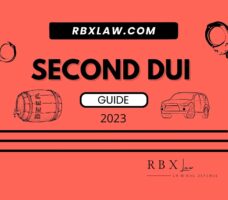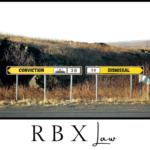Overview
The five parts of a second DUI case are: arrest, DMV hearing, court hearings, conviction, and sentencing. After an arrest, law enforcement sends notice of the arrest to the DMV on form DS 367. Once the DMV receives that form, they will take steps to suspend your license unless you contact them to contest the suspension within 10 days.
Law enforcement also sends a copy of their arrest report to local prosecutors. Prosecutors review the report and decide which criminal charges to file. If the defendant schedules a hearing within 10 days, the DMV mails a copy of the report to the defendant. The prosecutor also provides a copy of the report to the defendant’s attorney after charges are filed. Law enforcement does not provide a copy of the report to the defendant until the criminal case is resolved.
- DUI Investigation and Arrest
- DMV Hearing
- Court Hearings
- DUI Conviction
- DUI Sentencing
- Restricted License
DUI Investigation and Arrest
Officers usually pull DUI suspects over for poor driving or speeding. However, they also find DUI suspects using checkpoints, when responding to accidents, and when they locate parked vehicles. Once officers are close enough to smell alcohol or observe symptoms of alcohol (red eyes, slurred speech), they have enough suspicion to initiate a DUI investigation.
Officers typically ask DUI suspects to perform field sobriety tests during the DUI Investigation. Common field sobriety tests include: walk the line, stand on one leg, follow the finger, and count to 30. Another common sobriety test is the preliminary alcohol screening device, which takes a breath sample. You may refuse all tests prior to your arrest, unless you are on parole or probation.
Once law enforcement has placed you under arrested, you must provide a sample of your blood, breath, or urine for purposes of determining your blood alcohol content (BAC). If you refuse, the DMV can suspend your license for one year under Vehicle Code section 23612.
Documentation
When you are arrested, law enforcement will take your driver’s license and give you a temporary paper license that is good for 30 days. The temporary license has information on how to contact the DMV to prevent your license from being suspended. Law enforcement also provides a citation which includes a future court date, the charges, the arresting officer and their agency, and the citation number.
Charges
For a second DUI where no injury occurred, there are two charges on the citation. Both charges are misdemeanor DUI charges under sections and (a) and (b) Vehicle Code section 23152. Vehicle Code sections 23152(a) makes it illegal to drive “under the influence.” Vehicle Code section 23152(b) makes it illegal to drive with over .08% BAC. The defendant can be charged with both counts but can only be convicted and sentenced to one count. If the driver is arrested for driving under the influence of drugs, they are typically charged with one count (Vehicle Code section 23152(f)). If someone (other than the driver) is injured as a result of driving under the influence, the driver can be charged with felony driving under the influence under Vehicle Code section 23153.
DMV Hearing
You must contact the DMV and request a hearing within 10 days of your DUI arrest or the DMV will suspend your license. The issues at the DMV Hearing are 1) whether you were driving a vehicle; 2) whether your blood alcohol was over .08% when you were driving; 3) whether the officer had probable cause to arrest your for driving under the influence. You can contest the suspension of your license by presenting evidence, cross-examining witnesses, and testifying. Hearings are typically conducted over the phone, but in-person hearing are also available. It is extremely likely that the DMV will decide to suspend your driver’s license following that hearing.
License Suspension by DMV for DUI Arrest
For a second DUI, the DMV suspends the driver’s license for one year.
Court Hearings
If you bail out of jail or are released on your Own Recognizance, your first court date will be in a few weeks to several months down the road. The jail will give you paperwork with your court date when you are released. If the jail does not release you on OR, you will have a court date within 3 days of your arrest. At that hearing, the Court will consider whether they will release you on your Own Recognizance, change your bail amount, or release you on pre-trial supervision. Under pre-trial supervision, the jail releases the defendant but the defendant must follow specific restrictions until their case ends.
It is common for multiple Court Hearings to occur before the criminal case is resolved. The first hearing is called the arraignment. At the arraignment, the defendant enters a plea and the Court advises the defendant of the charges and their constitutional rights. If the defendant enters a not guilty plea, the case continues to pre-trial hearings, followed by trial. During the pre-trial phase of the case, the prosecutor and defense counsel discuss settlement of the case and prepare for trial.
Settling the Case
Before the first court date, the defendant can attend AA meetings, enroll in a recovery program, or wear a SCRAM alcohol monitor. These methods are regularly used and accepted by the Court. The Court and prosecutor typically see these as favorable factors when deciding the outcome of a case.
If your blood alcohol content was at or near .08%, the prosecutor may be willing to resolve your case for a wet and reckless, or dry and reckless charge.
Fighting the Case
You may fight your case by contesting the reason for a law enforcement stop, detention, arrest, and search. This is commonly referred to as a motion to suppress under Penal Code section 1538.5. You may also take your case to trial. At trial, the key issues will be 1) whether the defendant was the driver of the vehicle and 2) whether their blood alcohol was over .08% (or .01% if under 21) at the time they were driving.
DUI Conviction
A conviction occurs when the defendant enters a plea or is found guilty. A plea can be based on a plea agreement with the prosecutor or an “open” plea to the Court. Under an “open” plea, the defendant pleads to all charges and the Judge determines the sentence. At trial, the judge (court trial) or jurors (jury trial) determine whether the defendant is guilty.
DUI Sentencing
If the defendant enters a plea agreement, the Court typically sentences the defendant according to the terms of the plea deal. If a defendant is convicted by a judge or jury after a trial, the judge will determine the sentence. The judge also determines the sentence for defendants who plead “open” to the court. The judge may accept input on the sentence from the prosecutor, the defense attorney, the victims (if any), and any relevant agencies (IE: probation, law enforcement).
Maximum and Minimum Sentence
For a misdemeanor second DUI (without injury), the maximum sentence is 1 year in jail and a fine of $1,000. The minimum sentence is 90 days in jail and a fine of $390. A misdemeanor second DUI with injury is punishable by a maximum fine of $5,000 and 120 days to one year in jail. The punishment for a second felony DUI is 16 months, 2 years, or 3 years in prison. The judge may suspend the jail or prison sentence and place the defendant on probation. This allows the defendant to avoid or limit their actual jail time, provided they comply with the terms of probation for the duration of probation (3+ years).
Jail Time
Many counties in California allow a defendant to serve jail time via electronic monitoring or community service. These programs are typically referred to as “alternative custody” programs. However, some DUI convictions require actual jail time, even if the court places the defendant on probation.
| Charge | Mandatory Jail Time |
| 2nd DUI (Vehicle Code section 23542) | 96 hours |
| 2nd DUI with injury (Vehicle Code section 23562) | 120 days |
Fees
In addition to fines, the court can order the defendant to pay additional fees, penalties, and assessments to the court. The total amount due to the court for a second DUI usually exceeds the $1,000 maximum stated in Vehicle Code section 23540. The exact amount of your fine will depend on the fines and fees in the county of conviction.
DUI Class
The DUI class for a second DUI is 18 months or 30 months long, depending on the county of conviction.
License Suspension by DMV for DUI Conviction
If the Court convicts you of a second DUI, the DMV will suspend your license for 2 years. The suspension will run concurrent to the DMV suspension of your license. That means that the suspension will last for no more than 2 years. If the Court convicts you of a DUI causing injury under Vehicle Code section 23153, the DMV will revoke your license for 3 years.
Restricted Licenses
In order to continue to drive during your suspension, you will need to obtain a restricted license from the DMV. There are two types of restricted licenses: ignition interlock device (breathalyzer); and restricted. However, for a second DUI, only the ignition interlock restricted licenses is available. The driver must keep an ignition interlock installed in their vehicle for one year. In addition to installing an ignition interlock device, you must obtain an SR-22 from your insurance company, pay a fee to restore your license, and enroll in the appropriate DUI class. Learn more about restricted licenses here.




